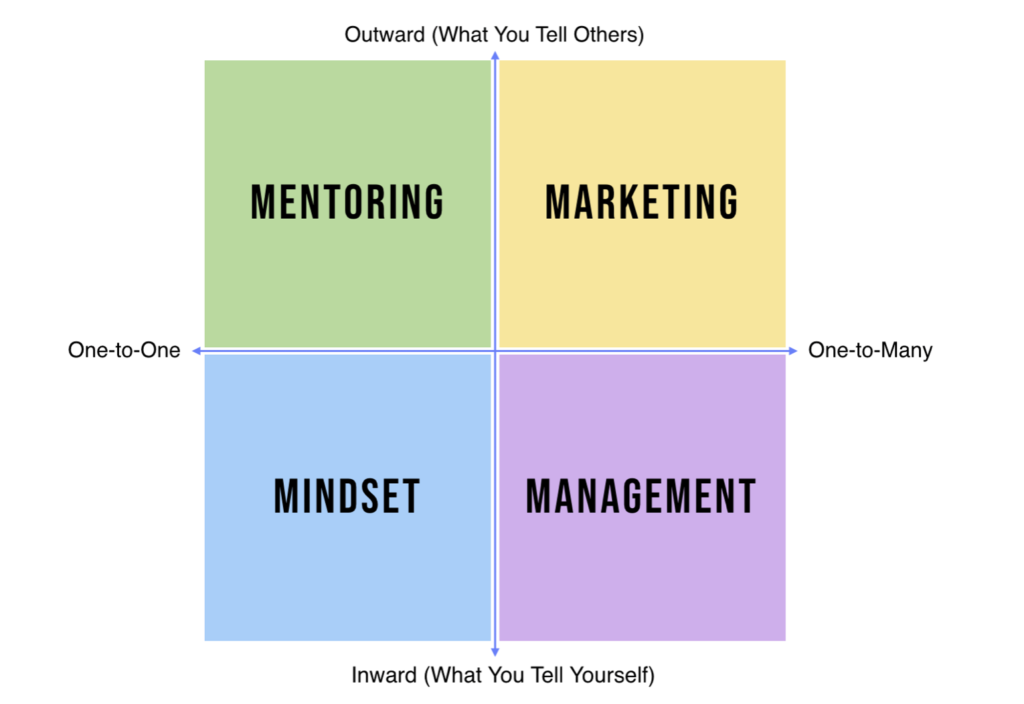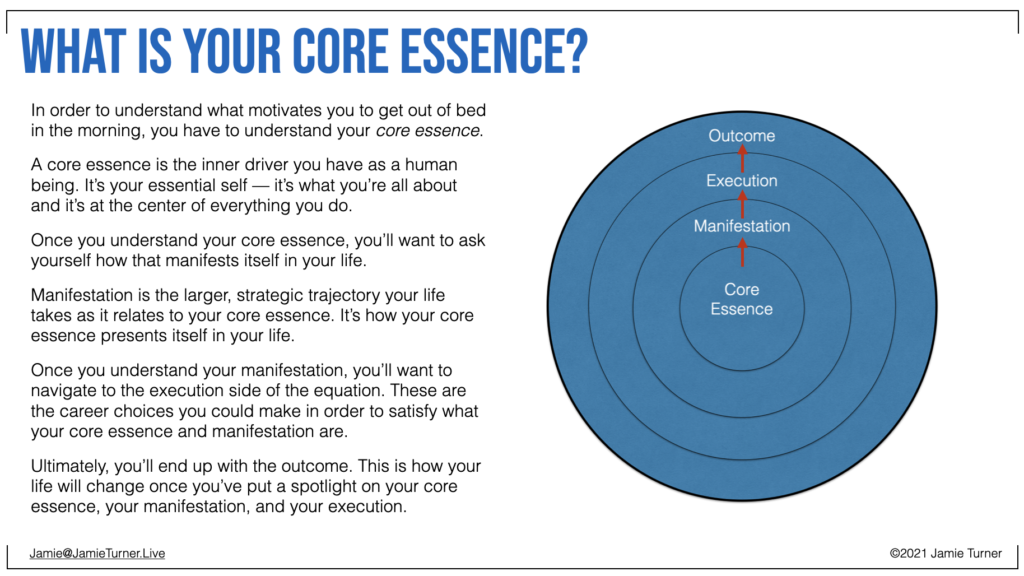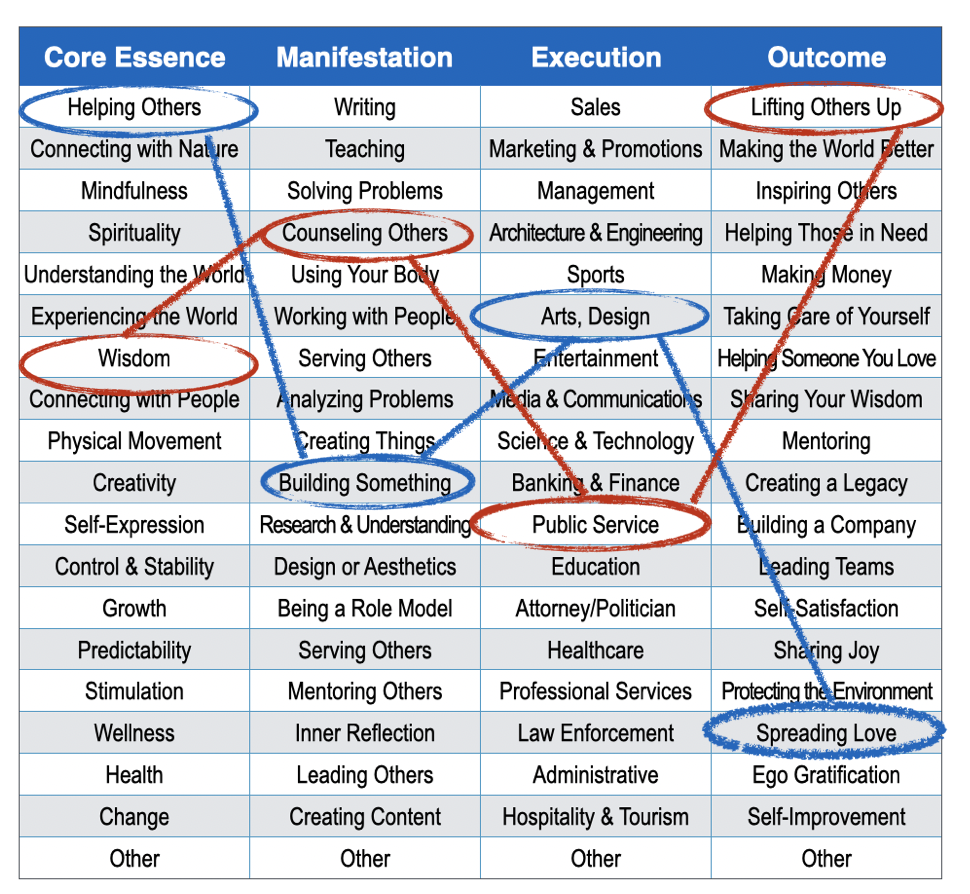If you’re like a lot of executives, you might have several people (or several dozen people) who report to you. They look to you for advice on how to solve problems, how to accomplish their goals, and how to navigate the normal challenges every young executive faces.
Given the volume of questions your mentees ask you in any given day, you’re probably exhausted by the time 5:00 rolls around.
That’s understandable — you’re trying to get your work done and, at the same time, provide good advice and coaching to the people within your organization.
Good news. There’s a lot of scientific research on how you can handle your own responsibilities while at the same time being a good mentor to your team members.
I discuss this research in my Unspoken Rules of Leadership workshops that I conduct for corporations around the globe. The teachings are part of phase II of the workshop, seen in the upper left-hand corner of the Unspoken Rules matrix below.

Why Mentoring Matters
Here’s an important question — what is a mentor and what, exactly, do they do?
A mentor is someone who teaches and coaches a (usually) younger employee on how to navigate the complexities of business.
Generally speaking, a mentor should be supportive and helpful while also challenging the mentee to reach their highest aspirational self.
A mentor’s duties include coaching, teaching, guiding, and modeling effective leadership behavior. A mentor can be a supervisor, a colleague, or even someone in another organization.
Not long ago, researchers analyzed dozens of studies and compared the various career outcomes of mentored and non-mentored employees. When they compared the two groups, they found that mentored employees received higher compensation, experienced a greater number of promotions, felt more satisfied with their careers, and were more likely to believe that they will advance in their careers.
Mentoring has also been found to help with employee retention. In one study, over 5,000 newly hired sales representatives were surveyed. Those who were part of a mentoring program reported significantly higher commitment to the organization and lower intentions to leave their organization.
Another study of 1,300 U.S. Army officers found that being part of a mentoring program reduced the chances of turnover by 38%.
It turns out the mentees aren’t the only ones who benefit. The mentors benefit, too. Those who are mentors report greater job satisfaction and organizational commitment, have greater career success, and have increase work-related fulfillment.
How to Be a Good Mentor
Let’s start with some fundamentals. In most (but not all) cases, a mentor will have more experience than the mentee.
That’s not always the case, but I recall when a friend of my daughter’s decided that they were going to become a career coach at the wise, old age of 24.
I didn’t have the heart to tell my daughter’s friend that they were going to struggle to find clients — there isn’t a 30+ year-old on the planet that wants to be mentored by someone a few years out of college. That’s just a fact. I’m not saying it’s good or it’s bad. I’m just saying it is.
So, now that we have the age and experience thing out of the way, let’s talk about one of the most important aspects of being a mentor — getting inside the mind of your mentee. By that, I mean understanding what drives and motivates them.
In order to understand what motivates someone, you have to understand their core essence. In The Unspoken Rules of Leadership workshops, I use the chart below to help attendees understand their own core essence as well as their mentee’s core essence.
A core essence is the inner driver you have as a human being. Said another way, a core essence is your essential self — what you’re all about.
Your core essence is at the center of everything you do. You can use the chart below to help you start to figure out what it is that drives and motivates you.
My core essence is to help others. Yours might be connecting with nature, self-expression, creativity, or something other than that.
When you understand your core essence (and your mentee’s core essence), you have a clearer sense of what drives and motivates the person you’re coaching.

Moving out from the inner circle of a core essence is the term manifestation, which is how your core essence manifests itself.
The manifestation is the larger, strategic approach you have to your life as it relates to your core essence. It is not your job — that will happen in the execution stage. Instead, the manifestation is how your core essence presents itself in your life.
My manifestation is teaching. That’s an outgrowth of my core essence, which is to help others. They’re linked together. As an example, my core essence is to help others and I do that through teaching.
What is your manifestation? Use the chart to highlight what works for you. And don’t be afraid to use the “Other” category if you have a different idea from the ones that are listed.
Once you understand your manifestation (or, in some cases, your mentee’s manifestation), you’ll want to navigate to the execution side of the equation. These are the tactics you’re going to use in order to satisfy what your core essence is and what your manifestation is. Again, you can use the downloadable chart to help you work through the executional side of the equation.
Ultimately, you’ll end up with the outcome. This is how your life (or your mentee’s life) will change once you’ve put a spotlight on your core essence, your manifestation, and the execution of these things.
In the end, your chart might end up looking like the one below. And here’s a fun exercise, have someone else in your life fill out the same chart in a different color ink. That “someone else” can be a spouse, a friend, a family member … whatever.
(Side note: I would not suggest having your mentee be your “someone else” with the chart. Your job as a mentor is to be a coach, not to be their friend, so keeping a little distance will help you be a more effective mentor.)

Why This Blog Post About Mentoring Took a Left Turn
You might be asking yourself, “Wait, I thought this was a blog post with tips about mentoring and suddenly we’re talking about my core essence. What’s that all about?”
I get it. But here’s the deal — if you want quick and easy tips on being a mentor, it’s pretty simple. Here they are:
- Communicate and listen
- Offer constructive criticism
- Practice empathy
- Give your mentee some space to make their own decisions
- Be a good role model
Easy-peasy, right? Those are the typical tips provided in blog posts about mentoring. But I wanted to give you something juicier and more substantial, which is why we talked about the Core Essence exercise above.
The Bottom Line
We’ve covered a lot of ground in this blog post. We started by discussing why mentoring is important. Then we moved on to discuss how and why you and your mentee should understand your core essence. And we wrapped up by tossing in some easy-peasy mentoring tips that you and everyone else in the world already know but might be worth re-visiting.
If you’d like to learn more about The Unspoken Rules of Leadership and the workshops I conduct around the globe, shoot me an email. Or, you can download my free e-book with 53-pages of tools, tips, and techniques you can use to become a better leader.
About Jamie Turner:
Jamie Turner is an internationally recognized author, university professor, and management consultant who speaks about leadership, persuasion, and marketing at events and conferences around the globe. You may have seen Jamie in Inc., Entrepreneur, Business Insider, or Forbes. He’s also a regular guest on CNN and HLN, where he delivers segments on marketing, persuasion, and leadership. Jamie is the co-author of several essential business books, including How to Make Money with Social Media, Go Mobile, and An Audience of One. An Audience of One has been called “One of the most important marketing books of the past decade” by Doug Busk, a former Global Group Director with The Coca-Cola Company. Jamie’s YouTube channel was designated one of the “Top 10 Business YouTube Channels” in the nation by Wishpond.com.
(Sources: https://www.sap.com/insights/hr/why-mentors-matter.html)